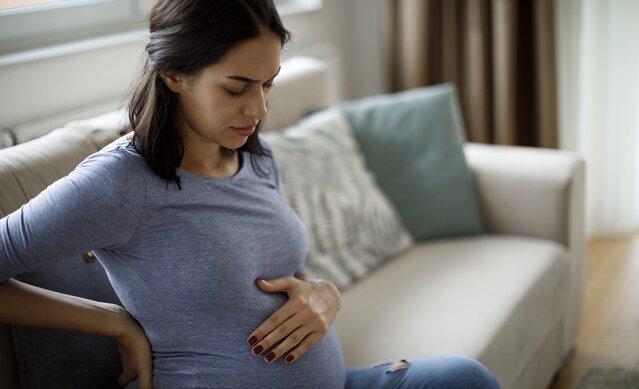Is the impact of COVID-19 on pregnant women more severe? We spoke with experts to learn more about the potential impact of the coronavirus on your pregnancy.
Since the coronavirus (COVID-19) began to spread around the world, it has caused widespread panic around the world. The disease has caused more than 49 million people in the United States, and researchers are still studying the severity of the coronavirus's impact on pregnant women or fetuses. According to the Centers for Disease Control and Prevention (CDC), pregnant women may be at higher risk of serious illness, hospitalization, and admission to an intensive care unit (ICU). Experts are looking for evidence to see if it is possible for the coronavirus to be transmitted from the mother's body to the baby through the placenta. Pregnant women who test positive for coronavirus have also been reported to have had preterm births.
Thankfully, though, most newborns with coronavirus don't seem to have any complications – and there's evidence that infected mothers' breast milk doesn't carry the virus.
Coronavirus and pregnancy
It's natural for pregnant women to worry about coronavirus. After all, they are at higher risk of contracting viral diseases due to changes in their physiology and immune systems. Women during pregnancy are at higher risk of contracting the flu and developing pneumonia compared to women who are not pregnant. Viral illnesses such as influenza increase the risk of miscarriage, birth defects, low birth weight, and other pregnancy complications.
Preliminary research suggests that coronaviruses follow the same trend. In studying coronavirus cases from January 22 to June 7, 2020, the CDC found that pregnant women were "much more likely to be admitted to an intensive care unit (ICU) and mechanically ventilated because of the coronavirus."
Women with COVID-19 may also be at greater risk of pregnancy complications such as miscarriage, preterm birth and fetal growth restriction.
According to the CDC, coronaviruses tend to affect the elderly and people with illnesses more severely, including women with preeclampsia, gestational diabetes and other complications.

Will coronavirus affect the fetus?
In July 2020, doctors in France documented the spread of the coronavirus from mother to baby in utero. According to the New York Times, newborns experience neurological symptoms, brain swelling, irritability and physical stiffness. But they recovered within three weeks without any complications.
Other studies have also shown that transmission through the placenta (vertical intrauterine transmission) is possible – although the odds of such an event are relatively low. But the good news is that most babies infected with the coronavirus have milder symptoms and recover without complications.
There are also some pregnant women infected with the coronavirus who have experienced premature births, stillbirths and miscarriages. According to a November 2020 report by the CdC, pregnant women may be at higher risk of preterm birth. Of the 3,912 babies born to a positive COVID-19 woman, 12.9 percent were born before 37 weeks, higher than the national average of 10.2 percent.
A study published in The Lancet also supports this claim. The researchers examined women who gave birth in California between July 2020 and January 2021. They found that women diagnosed with the new coronavirus had a 60 percent increased chance of having a very premature birth before 32 weeks' gestation. Their chances of having a preterm birth (32 to 37 weeks) increased by 40 percent and their chance of having a premature birth (37 to 38 weeks) increased by 10 percent. Pregnant women with comorbidities such as hypertension, obesity and diabetes are at greater risk of preterm birth after contracting COVID-19.
When breastfeeding after birth, there is evidence that mothers with COVID-19 are unlikely to transmit the virus through breast milk. If you do have covid-19, the CDC simply recommends wearing a mask and washing your hands before breastfeeding.
How to prevent the spread of the new crown virus
If you are pregnant or new to parenthood, avoid spending time in crowded indoor spaces and do not interact with anyone you may have been in contact with. In addition, the basic practice of preventing any respiratory infections is still effective, stay home if you are sick (and encourage others to do the same), cover your mouth and nose when coughing or sneezing, use disposable tissues and throw them away immediately after use, and get a flu shot. CdC also recommends the use of masks in public places where social distancing may be difficult, especially for unvaccinated people.
CDC recommends that you wash your hands frequently with soap and water for at least 20 seconds, and hand sanitizers that contain at least 60% alcohol can also work in a pinch, and it's especially important to wash your hands before eating or touching your face.
Finally, get the COVID-19 vaccine right away when you can get it.
I'm pregnant and think I'm infected with coronavirus – now what?
If you develop symptoms of coronavirus (cough, fever, shortness of breath), consult your obstetrician or doctor immediately and should take respiratory symptoms seriously as they can have a negative impact on pregnancy.
It is also important for pregnant women infected with the coronavirus to plan a delivery in a hospital because they are at risk of complications of the virus, such as pneumonia. Newborns should also be closely monitored for viral symptoms after birth.